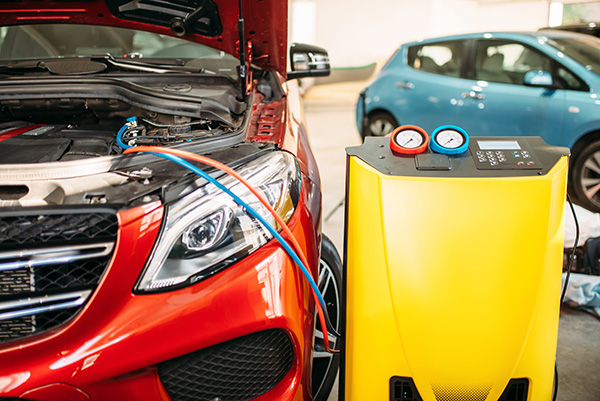
If you’ve recently bought a new car or are thinking about upgrading your vehicle, you may have noticed something different under the hood when it comes to the air conditioning (A/C) system. Specifically, more and more manufacturers are now using 1234YF refrigerant instead of the older, more familiar R-134a. You might be wondering why this change is happening and what it means for your car.
A Move Towards Eco-Friendly Refrigerants
One of the primary reasons for the switch from R-134a to 1234YF refrigerant is environmental impact. Traditional refrigerants like R-134a contribute significantly to global warming. While R-134a doesn’t harm the ozone layer like older refrigerants (such as R-12), it still has a high Global Warming Potential (GWP). To put this into perspective, R-134a has a GWP of around 1,400, meaning it has 1,400 times the heat-trapping capability of carbon dioxide.
In contrast, 1234YF has a much lower GWP of just 4, making it far less harmful to the environment. This substantial reduction means that cars equipped with 1234YF refrigerant help to reduce their carbon footprint and minimize their contribution to global climate change. Governments and regulatory agencies, particularly in Europe and the United States, have implemented strict regulations requiring car manufacturers to use low-GWP refrigerants, which is why 1234YF is now becoming the industry norm.
Improved Safety Standards
Beyond its environmental benefits, safety also plays a role in the widespread adoption of 1234YF. Older refrigerants like R-134a pose certain risks in the event of a car accident or a refrigerant leak. When released into the atmosphere, they can ignite if they come into contact with hot engine components.
1234YF, on the other hand, is designed to be more stable and less likely to catch fire in the event of a leak. Car manufacturers are leaning towards refrigerants like 1234YF because they can help reduce the risk of serious accidents related to the A/C system. This move towards safer, more stable refrigerants aligns with the automotive industry’s commitment to improving vehicle safety standards across the board.
Energy Efficiency and Performance
Switching to 1234YF isn’t just about safety and the environment—it’s also about performance. Cars using 1234YF tend to have more efficient A/C systems, meaning they can cool your vehicle faster and with less energy consumption. This increase in energy efficiency translates to better fuel economy, as your engine doesn’t have to work as hard to power the A/C.
When you’re stuck in traffic on a sweltering summer day, the last thing you want is for your A/C to struggle to keep you cool. The superior cooling properties of 1234YF refrigerant allow your car to maintain a comfortable temperature inside the cabin, even in extreme heat. The added bonus? You’re getting better gas mileage while staying cool—an all-around win.
Regulatory Pressure and Compliance
Another major factor driving the switch to 1234YF is regulatory pressure. Several countries and regions, including the European Union and California in the United States, have implemented stringent environmental regulations that require manufacturers to phase out high-GWP refrigerants like R-134a.
Starting in 2017, the European Union mandated that all new vehicles must use low-GWP refrigerants, which essentially pushed carmakers to adopt 1234YF. The U.S. followed suit, with similar regulations phasing out R-134a for new cars. The automotive industry’s transition to 1234YF is, in many ways, a direct response to these government regulations aimed at reducing the environmental impact of vehicles.
What It Means for Car Owners
For starters, if you own a car that uses R-134a, you’re not required to make any changes. The A/C system in your vehicle is designed to work with R-134a, and switching refrigerants isn’t necessary or recommended unless you’re facing a major repair.
However, if you own a newer model car that uses 1234YF, maintenance might be a bit different. Servicing costs for 1234YF systems are higher due to the refrigerant's increased price and the specialized equipment required to handle it. But don’t worry—while 1234YF may be more expensive than R-134a, the long-term environmental and safety benefits make it a worthwhile investment.
Is your car’s A/C not blowing as cold as it should? Whether you need a recharge or full service, Rick’s Automotive Service is here to help. Contact us today for expert A/C inspections and service, keeping your car cool and running efficiently!